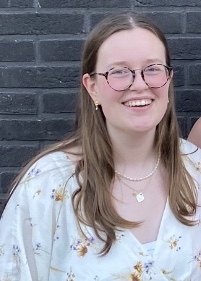
Why did you decide to do the IDA Master?
I really enjoyed writing my thesis and exploring new statistical methods and wanted to acquire new skills in this area. During my traineeship for the clinical master, I noticed that there are a lot of individual differences in, for example, development of psychopathology and treatment effectivity. This made me really curious and I wanted to go even further into depth. What solidified my decision is that this program is really broad and has an interdisciplinary approach, which really allows us to learn from each other as well.
Looking at the program schedule, which course excites you the most and why?
I have enjoyed all the courses so far, but I am really looking forward to the traineeships. Because then you can focus on a specific topic of interest and work together with experienced researchers!
Do you experience stress/pressure in your studies? How do you deal with it?
Oh, definitely! I have experienced stress, especially in the beginning, since I needed to get used to the high workload and difficulty of the materials. But I think that this is also normal when you start something new and this allows you to make the most of the experience and grow (in acquiring new skills and knowledge, but also as a person). What really helps me is to talk to other students about it. I feel like everyone is very supportive of each other and it helps to know that you’re not alone.
How can your knowledge from the IDA Master be useful for the real world?
I think this program really trains us to look critically at not only our own, but also at existing research. Studying individual differences also allows us to gain more insights into causes, development and maintenance of psychopathology. By getting a clearer understanding of these individual differences, I also hope that I can contribute to the improvement of current treatment methods.
Why do you think it is important to study what you study?
I think that because every person is unique and there is so much variability in the way we think, behave, and feel, it is important to gain more insights into these between-person differences. When considering clinical treatment interventions, this will hopefully allow us to let go of the one-size-fits-all approach. But also in a broader sense, focusing on the underlying mechanisms of these differences will lead to a better understanding of human behavior and development in general.
What is the most fascinating thing you have learned?
Oh, I don’t even know where to begin. What really stood out to me is thinking about the concept or definition of intelligence. How is it defined? Is intelligence that what we measure? I think this question can be applied to a lot of different constructs and it made me aware that it is so important to critically think about the assessment methods that you use to measure a construct when conducting research. What I also found really fascinating were the lab sessions for the Biological Correlates course, because then we got to apply the things we learned during the lectures on ourselves and our classmates!
What motivates you to keep studying?
I really enjoy the content of this program so far, so I think that in itself also really helps to keep on studying. The program is designed in such a way that it requires you to think about things in depth and this makes you want to understand things thoroughly. It also really helps to think about all the new skills and knowledge that you’re acquiring and how this can help you in the future both in a professional setting and as a person. It is nice that you can really create your own path in this program because there are so many opportunities to really focus on your specific interests, and that is something I am really looking forward to!
How are you experiencing the relationship with your teachers?
My experiences have been great so far. I very much enjoy the classes, and I really get the feeling that the teachers are there to help us learn as much as possible and make the most out of the experience.
















Be First to Comment